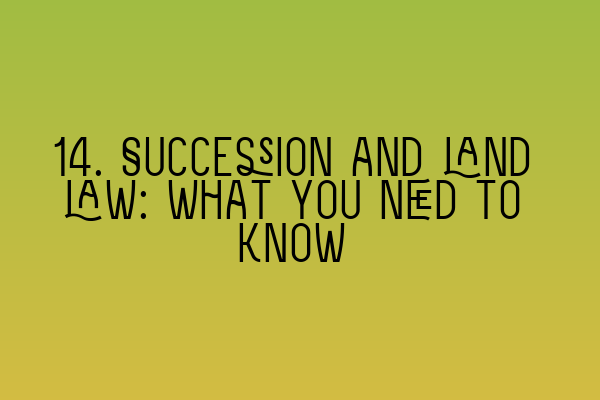14. Succession and Land Law: What You Need to Know
Welcome to another informative blog post brought to you by SQE Property Law & Land Law. Today, we will be diving into the intricate world of succession and land law. Whether you are a solicitor, law student, or simply interested in expanding your legal knowledge, this article will provide you with a comprehensive overview of the key concepts and principles in this area.
Before we delve further, let’s have a quick look at the related articles that may also be of interest to you:
– SQE 1 Practice Exam Questions
– SQE 1 Practice Mocks FLK1 FLK2
– SQE 2 Preparation Courses
– SQE 1 Preparation Courses
– SRA SQE Exam Dates
Succession and land law are vital components of property law, governing the transfer of property rights from one individual to another, either through inheritance or by other means. These areas are essential for solicitors dealing with wills, probate, trust administration, and real estate transactions.
At its core, succession law deals with the legal transfer of property upon a person’s death. It involves the distribution of assets in accordance with the deceased’s wishes, whether expressed through a valid will or determined by the default rules of intestacy. Understanding the key principles of succession law is crucial for advising clients on estate planning, administration, and potential challenges to wills.
On the other hand, land law focuses on the legal rights and obligations concerning land and its use. It encompasses various matters, such as ownership, leasehold agreements, easements, and restrictive covenants. Solicitors practicing in property law must have a firm grasp of these concepts to ensure seamless property transactions and protect their clients’ interests.
Now, let’s discuss some important aspects and concepts within succession and land law:
1. Wills and Probate: A will is a legal document that outlines a person’s wishes regarding the distribution of their assets after death. It is crucial for solicitors to assist clients in drafting a clear and valid will to ensure their intentions are met. Probate is the legal process of validating a will and executing its instructions. Understanding the intricacies of probate is essential for guiding clients through this sensitive and often complex procedure.
2. Intestacy: When a person dies without leaving a valid will, their estate is distributed according to the rules of intestacy. These rules vary depending on the jurisdiction and the deceased’s familial circumstances. As a solicitor, it is vital to be well-versed in the intestacy laws applicable in your jurisdiction to provide accurate advice to clients.
3. Trusts: Trusts are legal arrangements where one party holds assets on behalf of another party. Trusts can be established during a person’s lifetime (inter vivos) or created by a will (testamentary). Understanding the different types of trusts and their implications is crucial when advising clients on asset protection, tax planning, and charitable giving.
4. Land Registration: Land registration is a fundamental aspect of land law. In many jurisdictions, including England and Wales, the registration of land is compulsory. As a solicitor, having a solid understanding of land registration requirements and processes is essential for ensuring a smooth transfer of property and protecting your clients’ interests.
5. Leasehold Agreements: Leasehold agreements govern the relationship between landlords and tenants, commonly seen in residential and commercial real estate transactions. As a solicitor, fully comprehending the key provisions, rights, and responsibilities within leasehold agreements is crucial for negotiating favorable terms and resolving any disputes that may arise during the tenancy.
6. Easements and Restrictive Covenants: Easements are rights granted to individuals over someone else’s land, often for access or services. Restrictive covenants, on the other hand, impose certain limitations or obligations on the use of a property. Both easements and restrictive covenants can significantly impact property rights and transactions. Understanding these concepts is necessary when advising clients on the implications and potential complications they may face.
In conclusion, succession and land law are vital areas of expertise for solicitors practicing property law. A thorough understanding of the principles and concepts within these areas is essential for providing accurate advice, protecting clients’ interests, and ensuring compliant property transactions.
If you are a law student or aspiring solicitor, consider exploring SQE Property Law & Land Law’s comprehensive preparation courses:
– SQE 1 Preparation Courses
– SQE 2 Preparation Courses
Stay updated with the latest news and exam dates related to the SQE exams by checking out the link below:
– SRA SQE Exam Dates
We hope this article has provided you with valuable insights into succession and land law. If you have any further questions or require legal assistance, do not hesitate to contact SQE Property Law & Land Law. Our team of experienced solicitors is here to help you navigate through any complexities that may arise in this area of law.
